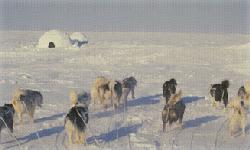|
Inupiat Eskimos from Alaska's North Slope have filed two lawsuits to try to block Phillips Petroleum's plans to explore an offshore prospect in the Beaufort Sea. Background: North America's rising energy demands and soaring natural gas prices could send U.S. corporations and the Canadia government north to Nunavut's trillion dollar gas supply. Nunavut means "our land" in Inuktitut, the language of the native Inuit. Established as a territory in April 1999, it accounts for 1.9 million square kilometers, nearly one fifth the size of Canada. "The figure we like to give is that Nunavut sits on $1 trillion of oil and gas," said geologist Benoit Beauchamp of the Geological Survey of Canada. It sits on great reserves and thereıs a market which is going to get them." The Middle East has enough oil to meet the worldıs needs, but an increasing demand for natural gas in North America is expected to send companies north to Nunavut. Gas consumption is forecast to rise by 33 percent in North America, according to Beauchamp. "So they have to find this gas somewhere,". The Arctic Islands are thought to contain 10 per cent of Canadaıs remaining crude oil reserves and 23 per cent of its gas reserves, but until now, the market wasnıt strong enough for companies to pay the high cost of development. Gas is increasingly in demand, because many coal burning electric generators have converted to gas which, unlike coal, burns cleanly and creates little pollution. The absolute gall of the situation is that the very oil-buring industries that are responsible for a majority share of responsibility for global warming and the already apparent melting of polar ice-caps and expected ice free Northwest Passage would spur even more interest in the high Arcticıs gas resources. In short, global warming is being exploited rather than reversed. Such is the socio-pathic madness of modern commerce. As in New Zealand and Australia, the last resort of defense of Nature is Native people's asserting their rights by previous agreements through the courts. The Suit Seven individuals filed their action Friday in the Ninth Circuit Court of Appeals, and Monday the Inupiat Community of the Arctic Slope, the tribal organization representing the eight villages of the North Slope Borough, filed their action in the same appeals court, said Jenna App, an attorney representing the individual plaintiffs. The lawsuits, filed against the U.S. Minerals Management Service, challenge that agency's decision to grant Phillips permits to explore the McCovey prospect 12 miles north of Prudhoe Bay, said App, a staff attorney for Trustees for Alaska, an Anchorage-based environmental law firm. Phillips has failed to meet the MMS regulations for oil-spill planning, App said. There are "very specific formulas" for responding to worst-case scenario spills that developers must abide by but which Phillips has missed, she said. And the Inupiat, who hunt for whales in the area of the McCovey site, have reason to fear an oil spill in there, App added. BP has flunked a series of oil-spill drills and failed to meet state standards for disaster contingency at its offshore Northstar field, she noted. Conditions at Northstar, only six miles from shore, are not as challenging as those at McCovey, she said. "If the oil industry can't demonstrate that they can clean up an oil spill six miles out, how in the world are they going to demonstrate it 12 miles out?" she said. The Inupiat Community of the Arctic Slope has also sued to block development at Northstar, a 175-million barrel field where BP Exploration Alaska Inc. expects to start production late next year. The tribal organization filed its challenge to the McCovey project after the North Slope Borough reversed its earlier objection to Phillips' plans to build an ice road to the unit. The Inupiat oppose all offshore drilling in the Arctic because of the oil-spill risks, said Bill Tegoseak, one of the original seven plaintiffs. "We see no national security need to explore for fossil fuels in the Arctic Ocean at the expense of jeopardizing the health of all segments of Arctic life," he said in a release Monday. Phillips Alaska Petroleum is pressing forward with its plans to do its exploration drilling this winter at McCovey, said Dawn Patience, a company spokeswoman. The company plans to build an ice road to gain access to the site and an ice island to stage the drilling, she said. Because the work is planned for the winter, when the sea is frozen solid, oil-spill risks are minimal, Patience said. "There is no activity during broken ice or open water," she said. If Phillips decides to pursue development at McCovey, it will have to apply for new permits and submit to an environmental impact statement, she said.
|

